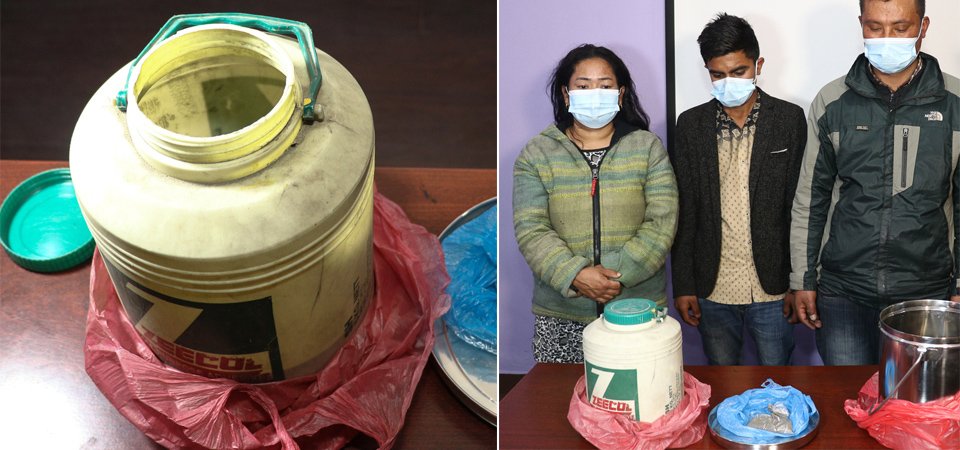Experts point out carelessness in handling recovered uranium, warn of health hazards

By Chhetu Sherpa, Kathmandu, Mar. 16: Experts have pointed out that no safety precautionary measures were taken to handle the amount of uranium after the police seized it a few days back from a house at Bauddha in Kathmandu.
The police had seized 2.5 kg of uranium from the house.
A preliminary research report of the Nepal Academy of Science and Technology (NAST) has also stated that some properties of uranium-238 have been found in the recovered item.
Uranium is a sensitive and very harmful substance from health point of view. However, minimum safety precautions were not taken even during the press conference held after the police recovered it.
National Nuclear Policy, 2007 of Nepal states that basic security measures of international standards will be followed while operating nuclear energy-related plants, managing radioactive substances. However, even the basics standards such as wearing the Personal Protective Equipment (PPE) were not followed after recovering the uranium.
Dr. Suresh Kumar Dhungel, spokesperson of the NAST, said that one Deputy Superintendent of Police (DSP) had contacted him after recovering uranium about 10 days ago. He then informed DSP to handle it carefully. However, Dr. Dhungel said that not even a basic consideration was adopted over the matter.
He said that it was unfortunate that the police did not take any precautions after recovering the uranium, a radioactive substance that should not be used. "Uranium is extremely dangerous to human health," he said, adding that caution should be exercised at any time.
There is no technology in Nepal to measure whether it is uranium or not, but the initial test of the uranium tested by NAST showed that the properties of uranium-238 have been detected in the recovered uranium.
According to spokesperson Dhungel, normal activity has been observed, it is not clear what the properties of uranium are, so it is necessary to re-test. The family members of the house where the substance was kept may have been affected by the radiation of the uranium for the substance was kept there for over 20 years.
Experts also suggested that the uranium was kept in a normal plastic container, which may have had an effect on the Tamang family and its surroundings.
"Alpha, beta, and gamma rays are produced from uranium," said Prof. Dr. Tulsi Pathak, former head of the Department of Chemistry at Tribhuvan University and a nuclear chemist. He said that rays of Alpha and beta are not that harmful but rays of gamma are more harmful. When gamma reaches the body then it makes hair fall, creates nausea, and even infertility and cancer.
According to Dr. Pathak, Alpha Beta Gamma Ray has to be kept in a 6-inch thick glass (lid) bottle to keep it safe from plastic containers, only then the effect of radiation is lessened so it is no way that the simple plastic container seizes the harmful rays.
He further advised the police not to play with uranium.
Police have arrested four persons along with 2.5 kilograms of uranium and made them public.
Among the arrested are Narayan Singh Tamang, aged 40, of Likhu Tamakoshi Rural Municipality -5, Ramechhap, Januka Tamang, aged 40, who leaves in Bouddha, Kathmandu, Prakash Chauhan, 20, of Ramechhap and Manoj Neupane, 20, of Sunkoshi-4, Sindhuli.
They were looking for a customer in the sale and distribution of uranium. In Nepal, only NAST and Tribhuvan University (TU) can conduct preliminary tests of uranium.
Spokesman of NAST Dhungel said that uranium should be sent abroad for further testing.
Recent News

Do not make expressions casting dout on election: EC
14 Apr, 2022
CM Bhatta says may New Year 2079 BS inspire positive thinking
14 Apr, 2022
Three new cases, 44 recoveries in 24 hours
14 Apr, 2022
689 climbers of 84 teams so far acquire permits for climbing various peaks this spring season
14 Apr, 2022
How the rising cost of living crisis is impacting Nepal
14 Apr, 2022
US military confirms an interstellar meteor collided with Earth
14 Apr, 2022
Valneva Covid vaccine approved for use in UK
14 Apr, 2022
Chair Prachanda highlights need of unity among Maoist, Communist forces
14 Apr, 2022
Ranbir Kapoor and Alia Bhatt: Bollywood toasts star couple on wedding
14 Apr, 2022
President Bhandari confers decorations (Photo Feature)
14 Apr, 2022










